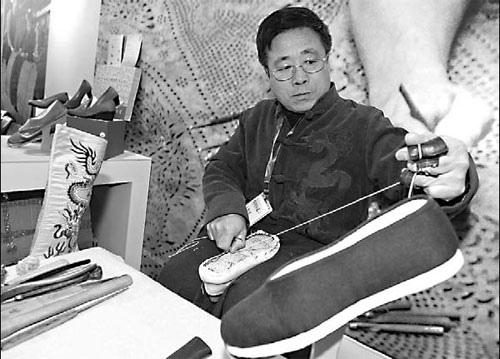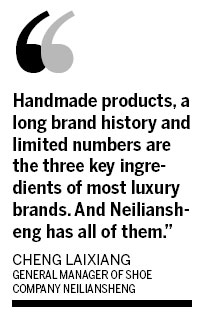
Zhao Ting was a man obviously well ahead of his time.
More than 100 years ago the Beijing shoe-company founder issued a kind of mission statement that more or less said: "We're here to serve the person sitting in the sedan chair, not the one pulling it."
Today a business textbook would probably render that as "target those at the top end of your market".
But whatever the interpretation, the formula seems to have worked a treat for the shoe company, Zhao founded.
Neiliansheng, founded in 1853, is not only in fine fettle, but seems as sure-footed as ever in its mission, with a clear idea of when it needs to stick to its roots and when it needs to innovate.
|
 He Kaiying, a master shoemaker at Neiliansheng, demonstrates his expertise in stitching soles. [Photo / China Daily] |
One of the most valuable parts of its heritage - apart from its trademark cloth shoes - is a method it devised to ensure it accomplished its mission: keeping detailed profiles of its customers.
Indeed, Neiliansheng is regarded as one of the first companies in Chinese commercial history to create what would now be called a database of its high-end customers.
The book that Zhao compiled, recording, among other things, customers' shoe sizes and fabric preference, was called Luzhong Beizai (shoe-data memoranda) and is regarded as such a classic of marketing, that it is used as a case study in MBA curriculums at colleges such as Peking University Guanghua School of Management.
In the cloth-shoe museum in Neiliansheng's flagship store on Qianmen Street, Beijing, visitors can see the Luzhong Beizai, which includes profiles of political leaders such as Mao Zedong, Zhou Enlai and Deng Xiaoping.
|
 |
In 1956, the store was put into State-private ownership.
During the "cultural revolution" (1966-76), Luzhong Beizai fell into disuse, and about three years ago the company decided to write a modern version.
In early 2010, Neiliansheng set up a customer relationship system based on membership to manage the profiles of clients who need a customized service.
When customers enter the store, they select their favorite fabric and pattern, and then designers tailor and measure their feet. And all the data, including the sizes, shapes and preferences, are recorded in a computer.
"When the customer wants to buy another pair of Neiliansheng shoes, they don't have to come to the shop," said Cheng Laixiang, the general manager.
"This is why it is more convenient than shopping in physical stores and why the shoes fit better than when you shop online."
To date, the modern Luzhong Beizai has collected information about nearly 4,000 customers. The system also helps analyze customer habits, which provides a guide to market trends.
"The modern database is a huge asset for the business," Cheng said.
Last year, Neiliansheng took one of its trickiest orders: to make a pair of shoes for the former vice-president Zeng Qinghong, which were being given to him as a get-well gesture.
The problem was, that for a month Zeng's heels needed to stay clear of the ground, and many shoemakers said they could not fulfill the order.
Neiliansheng finally came up with a pair of shoes sporting heels with 10 layers that were 3-centimeter thick.
"Every three days the patient tore off one layer without feeling it, and one month later the last layer was torn off and the feet touched the ground," Cheng said.